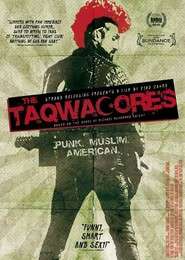The Taqwacores

"We should go out West sometime, Yusef Ali. Get a van, make like an interstate jam'aat... And along the way we'd round up all the queer alims, drunk imams, punk ayatolahs, masochistic muftis, junkie shaykhs, retarded mullahs, and guttermouthed maulanas we can find, just load up a van 'til we can't fit no more and then have guys hanging' off the side like in Rawal-fuckin' pindi! Shit, man, down the 1-90. And it all ends in Khalifornia."
First a book by Michael Muhammad Knight, then a subculture, and recently a movie. In short: punk Islam - oxymoron, or two great tastes that taste great together?
In long: a group of young American Muslims from diverse backgrounds live and hang out together in cheap off-campus housing in Buffalo, New York (of all places). Yusef Ali, a straight-laced college student majoring in engineering because his parents told him to, moves in to what he expects will be a pretty standard all-Muslim flat.
Wrong.
Aside from the ... traditional Umar, the flat's home (either literally or spiritually) to a burqa-wearing Riot Grrrl, a Shia skinhead with KARBALA tattooed on his chest, a hashishiyun, a Flamboyant Gay, a white convert in short shorts, and most prominently, the messianic Jehangir who plays the call to prayer on a electric guitar and talks incessantly about a mystical taqwacore scene out West in "Khalifornia." After a dream where Jehangir meets Johnny Cash, he decides that his calling is to bring all the taqwacore bands from out west to Buffalo, to put together the Islamic punk concert to end all concerts.
Most of it is a coming-of-age story about young American Muslims struggling to find a way to reconcile their love of Allah (SWT), their cultural identity, and their belonging among the ummah with things like feminism and drinking beer. Better Than It Sounds.
The author of the original book had written it as a way of saying of goodbye to Islam, believing that the Islam he wanted to practice didn't exist. However, Muslims all over the country read his book, thought, "Hey, punk Islam. That sounds like a good idea." They learned to sing and play musical instruments (or not ... it is punk, after all), and voila, a Real Life taqwacore scene was formed. Many of the scene's most prominent bands, most or all of whom were inspired to start a band by the book, play in the movie. It's also a massively influential cult classic among young American Muslims in general.
- All There in the Manual: Helps if you are Muslim or know a Muslim guy so you can ask them why Yusef is washing his feet in the sink.
- Did Not Get the Girl: Yusef Ali and Lynn. He's frightened by her sexuality and when she comes on to him, he freaks out and breaks everything off.
- Downer Ending: Conservative band Bilal's Boulder, who don't even allow women into their concerts, beat Jehangir to death the night of the taqwacore concert. After his death, everyone moves away and Yusef returns to his parents and old way of Islam. In the film it's a little more like a Bittersweet Ending, implying that Yusef's become a stronger person and more secure in his deen, but that's all.
- Dreaming of Things to Come: In the book.
- Ear Worm: I wanna handjoooob, whoa-oh.
- Ho Yay: Jehangir and ... everyone.
- Humans Are White: Averted, which is good if you've been recommending the movie to people who want to know what those scary Muslims are really thinking - it tries to show the true diversity of the Muslim world in many different ways, one of which is that there are plenty of white, black, and Asian Muslims hanging around as well as your standard Southeast Asian and Middle Easterns.
- The Faceless: Rabeya, who wears a full burqa. (Also in the book Ambiguously Brown, there's some discussion in the book about whether she's black or Iraqi or what). Stoner Fasiq is incessantly fascinated with why she does so, especially since she's a feminist.
- Fan Service: Amazing Ayyub is just too Crazy Awesome for clothes.
- Funny Aneurysm Moment: In Osama Van Halen, Rabeya beheads the Author Avatar in the parking lot of Bridges TV, the first American Muslim TV network to broadcast entirely in English. (It's a very meta book.) Unfortunately, the building recently became the scene of a murder by the CEO (Muzzammil Hassan) who went Ax Crazy and beheaded his wife. The author added a note explaining that the tragedy hadn't happened yet when he wrote it, the similarity was completely unintentional and that he wrote his own beheading as a symbolic, feminist act.
- Pragmatic Adaptation: The movie cuts down on a lot of the philosophical discussion of Islam that would either kinda be boring considering the pace of the film, or would just confuse a wider audience - for instance, Rabeya gives a khutbah about the Virgin Mary being a Prophet instead of a story about the intelligent and strong-willed Aisha (RAA).
- Averted in that the characters talk just like real life Muslims do, throwing out an inshAllah or such and such here and there without any explanation. (inshAllah: if God wills it, typically said whenever there's an intention to do something, such as "I'm gonna go take a leak, inshAllah.")
- Speed Dating: Islamic-style, in form of a Terrible Interviewees Montage, astaghfirullah.
- Token White: Lynn, Yusef's love interest. After reading Rumi she decided to convert to Islam, but was scared off by the people telling her to wear hejab, break up with her boyfriend, take an Arabic name, give dawah to her family, stop listening to music, and get rid of her dog two seconds after taking shahadah. Now she's just sort of generally spiritual.
- The War on Terror: Refreshingly ignored.